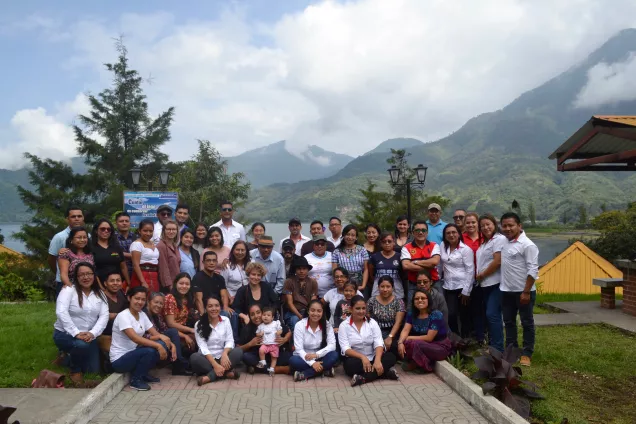
Having wrapped up my first month at Adisa, I am inclined to reflect more carefully on my experience to date. While in many ways I still feel like I’m adjusting and figuring things out, I’m also surprised by how much I’ve already learned. I might still not know how to navigate all the callejones of Santiago without getting lost but I do know where to buy my avocados, how to introduce myself in Tz’utujil, and how to give a fairly informative tour of Adisa.
When I arrived in Guatemala, Adisa’s 20th anniversary celebrations were in full swing and I was immediately moved by the organization’s story and the widespread support it has garnered in the community. When their daughter was born with hydrocephalus, Francisco and Argentina, Adisa’s co-founders, were disappointed by the lack of services for people with disabilities. What was once a small committee of parents of people with disabilities, is now a thriving organization serving over a thousand individuals with disabilities around Lake Atitlán.
Last week, as part of my responsibilities as the Development Coordinator at Adisa, I had the opportunity to interview the family of Eduardo, one of Adisa’s users, to be featured in our newsletter and on our website. Eduardo, like any 11-year-old boy, enjoys playing with his friends, climbing trees, and watching TV. His disability requires him to attend physical therapy and speech therapy and he also takes advantage of our psychological and tutoring services.
While most of my conversation with his mother served as a testament to the positive impact that Adisa has had on the lives of so many children with disabilities, I was surprised to learn that Eduardo has repeated the first grade three times. Eduardo’s story, and much of my work at Adisa, has made me reflect more deeply on the topic of special education. Are students with intellectual or developmental disabilities in Santiago Atitlán better off in the “regular” schools or the special education school?
Inclusion for people with disabilities is something that I thought about frequently before coming to Guatemala. My volunteer experiences with Best Buddies International exposed me to the lack of opportunities, discrimination, and exclusion of people with disabilities in the United States. However, this fight for inclusion has taken on new meaning here in Guatemala. Ignorance not only limits the opportunities for socialization and employment for people with disabilities in Guatemala but also affects access to adequate healthcare and education for these individuals.
I continue to learn and experience new things every day and, bit by bit, Santiago Atitlán starts to feel more and more like home. I’m immensely grateful to everyone that has already helped me to make this a smooth transition and I’m excited to see where these next eleven months, in this beautiful country, at this wonderful organization, take me.

